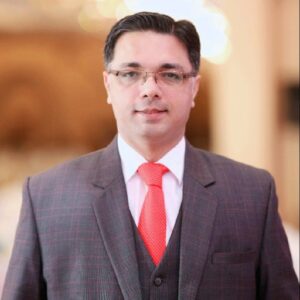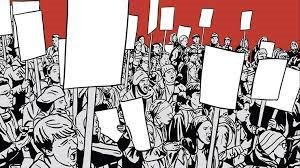 Muhammad Azfar Ahsan
Muhammad Azfar Ahsan
Long hauls often necessitate one to walk around inside the aircraft. I often stand peering through the tiny window on the emergency door, looking down at the passing ‘Lilliputian’ landscape of mountains and cities. It is a strange feeling to know that you are cruising at 35000 to 40000 feet with only one force holding you aloft – that being the equilibrium.
Equilibrium, as an instrument of resilience in Islamic philosophy, forms the basis for the integrated approach of Islamic ethos. It is this equilibrium that enables the orators to persuade thousands with the sincerity of their truth. This perfect harmony in words and tonality transforms a statement into a timeless and significant expression. Phrases like ’To be or not to be“, ’‘What’s in a name“, ’‘The only true wisdom is in knowing you know nothing,’“ and “Change is the only constant in life” ingrained in our neural pathways, are great examples, ready to be invoked at the slightest opportunity for us to appear noteworthy.
What we hear today is garish, offensive if not downright humiliating. Name-calling and aggression coded in terms like Youthias, Jiyalas, or Patwaris, resound on social and electronic media. The diminishing capacity to argue intellectually has brought the participants down to physical skirmishes on live shows. Print media, which still carries germs of intelligent perspectives, is subject to ‘shrinkflation’ – that is visibly losing volume and visibility, while electronic thrives on shallow, irrelevant, and often provocative content for the essential TRP. There is a noticeable disregard for the dignity of individuals or institutions, and a complete absence of the science of interweaving dialogues for effective outcomes, or for an equitable platform, to ensure that every perspective is distinctly audible.
PTV, with its array of past shows, captivated audiences with content adorned with punch lines and intellectually profound discussions. Personalities like that of Ashfaque Ahmed, Mushtaq Yousafi, and Pitras Bukhari dominated the screens. Anchors followed Zia Mohiuddin’s finesse of delivery, with regular references to the authors and poets whose books were bestsellers, whether Faiz Ahmed Faiz or Ibne Insha. People respected the elders for their wise counsel and sought guidance from them. Younger generations imbibed the profound aesthetics of engaging in discussions across generations within family and friends’ circles.
Where has all that gone? Top of Form
During the Karachi Literature Festival’s session on the future of Pakistan, my fellow panellists shared a disheartening observation about Pakistan heading in an unfortunate direction, encapsulated by the acronym FIL – Flourishing Illiteracy. The disappointment lies not with the illiterate population, but more so with the educated individuals on television shows and behind microphones in public forums. They have forsaken the art of persuasion in favour of issuing threats, responding with loud and uncivilized reactions, resorting to physical rowdiness, engaging in name-calling, and, most notably, subjecting fellow Pakistanis to humiliation based on their political, religious, or ethnic affiliations. Whether one is Shia, Sunni, a member of any religious minority, affiliated with a political group, or categorized by cultural distinctions as a migrant or holding a provincial identity, the divisive labels are deplorable. The media must realize that furthering individual economic gains via the frightening power of polarizing content is not going to help them sail their ship – they are drying the very ocean that the ship needs to achieve that purpose. Secondly, if the Pakistani’s identity is suffering degradation far beyond the challenges posed by the sinking currency, it is the very house that they live in. The huffing and puffing wolves need to be given a shut-up call.
The abolishment of student unions has not helped. Until the 1980s, universities were vibrant with student unions and political think tanks. These students actively engaged in debates and campaigns and played a crucial role in fostering awareness about right and wrong. Labour unions diligently safeguarded the rights of the working class (mazdoors) and had representatives who negotiated with employers (seths). Leaders of union councils served as caretakers within their communities, being accessible to address questions and concerns.
This thriving grassroots democracy required protection, guidance, and mentorship. However, the imposed ban around that time may have temporarily halted occasional conflicts, but they completely extinguished our prospects as a politically, culturally, and economically nurtured nation.
What we are currently witnessing is the complete erosion of rational and constructive thought. In the past, figures like Iqbal and Tagore navigated the intricate landscape of Indian politics and conflicting freedom movements, and Maulana Maududi and Josh Malihabadi maintained a mutual friendship despite their divergent views on Political Islam and Marxism. Our political and talk shows once featured robust yet civilized logical debates, allowing the public to adopt their preferred perspectives without fear of humiliation. This highlighted the tolerant nature of society at that time. However, present-day political ideologies and rhetoric no longer have a significant impact, and the tumultuous arguments in talk shows lack any coherent meaning. Despite fervently condemning what is considered ‘haram’ in a religious context, we conveniently overlook the inclusion of hypocrisy, anger, or deceit in the list.
Dialogue stands as a cornerstone of philosophical inquiry, fostering intellectual growth, mutual understanding, and the continuous evolution of human thought. The value of dialogue in a philosophical context is fundamental to the exploration and development of ideas. Involving the exchange of thoughts, perspectives, and arguments, dialogues serve the crucial purpose of refining ideas, clarifying concepts, identifying inconsistencies, and deepening one’s understanding of issues.
Socrates, walking through the sun-lit cobbled streets, introduced the Socratic method– posing and answering questions to stimulate critical thinking, encouraging active engagement, and self-discovery, and aiding individuals in arriving at insights through reasoning. Ibn Khaldun’s Muqaddima is another noteworthy example of rhetoric, encompassing a comprehensive 360-degree approach.
Pakistan urgently requires this essential element, akin to oxygen. In fact, I would request all the political parties to play a determining role here. They must understand the intensity and magnitude of the crisis and their role in addressing this situation. We must open free platforms for open and constructive dialogue with a commitment to democratic processes to logically address concerns that function as barriers in our path. Education and health crises, climate change, grassroots empowerment, opportunities for youth employment or entrepreneurship, accessibility to financial and legal support, digital literacy, and other crucial issues require essential conversations among all stakeholders. We need to discuss these matters without resorting to name-calling, brawls, or abusive behaviour.
Engaging in respectful and constructive conversations is encouraged in the holy Qur’an, and the Prophet Muhammad (Peace Be Upon Him) exemplified the importance of dialogue by seeking peaceful resolutions to conflicts and emphasizing the power of effective communication. Islamic teachings emphasize listening with empathy, speaking truthfully, and treating others with kindness. The value of dialogue in Islam extends to promoting tolerance, building bridges between communities, and working towards the common good while upholding principles of justice and righteousness concerning existence, knowledge, morality, and the nature of reality.
Restoring equilibrium to our arguments is crucial for our journey to reach its destination. Concepts like “Sulh” (conciliation) and “Tahkeem” (arbitration), as well as “Sulh-e-Kul” (peaceful coexistence), are part of a legacy we should be proud of. If ever in doubt about defending certain actions in the name of argument, one can turn to Surah Abasa, Ayat 1-3, to see what Allah shares with the Holy Prophet (PBUH) regarding the importance of maintaining composure. Additionally, one can recall the hadith that highlights the significance of reconciliation between people as something better in degree than extra fasting, prayer, and charity (Tirmidh? 2509, Ad?b Al-Mufrad 391).Courtesy Business Recorder
The writer is a former Chairman Board of Investment. He can be reached at @MAzfarAhsan



